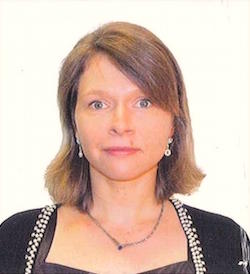 Inta Mieriņa, the Juris Padegs Research Fellow in Baltic Studies at Yale University for the Spring 2016 semester, is a Senior Researcher at the University of Latvia’s Institute of Philosophy and Sociology, where she is the scientific director of the EEA/Norway grant “Rural Depopulation and the Governance of Education. Comparative Study of Latvia and Norway.” She was director of the ESF research grant “The Emigrant Communities of Latvia: National Identity, Transnational Relations, and Diaspora Politics,” in which 14,068 Latvian emigrants were surveyed in 118 countries. The project received the 2014 University of Latvia Annual prize in science.
Inta Mieriņa, the Juris Padegs Research Fellow in Baltic Studies at Yale University for the Spring 2016 semester, is a Senior Researcher at the University of Latvia’s Institute of Philosophy and Sociology, where she is the scientific director of the EEA/Norway grant “Rural Depopulation and the Governance of Education. Comparative Study of Latvia and Norway.” She was director of the ESF research grant “The Emigrant Communities of Latvia: National Identity, Transnational Relations, and Diaspora Politics,” in which 14,068 Latvian emigrants were surveyed in 118 countries. The project received the 2014 University of Latvia Annual prize in science. Dr. Mieriņa is the editor of the new book Latvijas emigrantu kopienas: Ceribu diaspora [The emigrant communities of Latvia: diasporas of hope] (Riga, 2015). The volume focuses on the experiences, attitudes, networks and identities of individuals who emigrated from Latvia after 1991. Dr. Mieriņa’s publications have appeared in Social Science Research, The Sociological Review, European Societies, Europe-Asia Studies, and Polish Sociological Review and other journals. She has been involved in a number of large-scale international comparative studies, mostly on youth and participation. She completed her Ph.D. at the University of Latvia in 2011 in the field of Sociology. Her doctoral thesis was titled “Political Participation and Development of Political Attitudes in Post-Communist Countries.”
Dr. Mieriņa’s project at Yale, “Integration of the New EU Migrants: Why Some Countries Do Better than Others?”, builds on her work in the fall of 2015 as a Fulbright research fellow at the University of Washington, where she studied the social and political participation of Latvian youth abroad as compared to in their home country. Research indicates that immigrants from the same country of origin who share a similar socio-economic and cultural background can perform differently in different countries, depending on context, such as different national policies and institutional settings. Using information from the large-scale survey of migrants in various countries in which she was director, Dr. Mieriņa aims to determine the contextual factors (opportunity structures, integration policies, socio-economic context) that have the greatest influence in ensuring successful integration of migrants in terms of employment, education, social inclusion, and active citizenship. Dr. Mieriņa’s research is expected to contribute to current debates on the effectiveness of varying integration policies and approaches to migrant integration.

